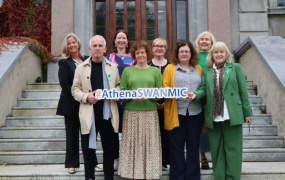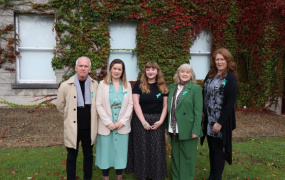Campus Development & Sustainability
Climate Action and Sustainability
Mary Immaculate College made significant strides in advancing its climate action and sustainability agenda during the 2023/24 academic year, demonstrating leadership in addressing one of the defining challenges of our time. Our commitment to environmental stewardship aligns with our institutional mission and values, while fulfilling our obligations under the Public Sector Climate Action Mandate.
Climate Action Performance
Exceptional progress was made in our decarbonisation efforts during 2023/24. The College achieved a reduction in emissions of 113,038 kg CO₂, successfully avoiding displacement of over 113 tonnes of carbon emissions to the atmosphere. This significant achievement represents both our institutional commitment to climate action and the collective efforts of our campus community.

Our primary energy usage reduced across all energy types, with thermal energy (gas and kerosene) decreasing by 532,720 kWh, electrical usage reducing by 44,833 kWh, and transport emissions falling by 64 kWh. These reductions yielded both environmental and financial benefits, with the College saving almost €60,000 (€59,608) in energy costs during the year.
Since establishing our baseline in 2018, MIC achieved an 18.4% reduction in total emissions, demonstrating steady progress toward our 2030 target. Our baseline emissions of 1,913,671.5 kgCO₂ were reduced to 1,560,751.2 kgCO₂, with particularly impressive reductions in electricity-related emissions, which decreased by 75% within the overall reduction.
The College's commitment to energy efficiency was reflected in our improved Building Energy Rating (BER) certifications. Our Thurles campus achieved a remarkable improvement, advancing from a B2 rating in 2023 to B1 in 2024, with CO₂ emissions reducing by 21% from 38.59 kgCO₂/m² to 30.46 kgCO₂/m². This achievement was particularly noteworthy given the age of our building stock and reflected the dedicated efforts of our Green Campus Committee at Thurles.
Our Limerick campus maintained its C3 rating while achieving a slight reduction in emissions to 61.66 kgCO₂/m² from 63.87 kgCO₂/m² in the previous year. Given the challenges of maintaining ratings for older building stock, this represented a positive outcome and demonstrated our ongoing commitment to energy efficiency across all campuses.
MIC's Climate Action Roadmap 2030 (CAR/MIC 2030) represents our comprehensive response to the Public Sector Climate Action Mandate's call for leadership in climate action. The roadmap establishes six thematic categories that guide our sustainability efforts:
- Emissions-First Focus: Prioritising direct reduction of greenhouse gas emissions
- Institutional Ethos: Embedding sustainability in our mission and values
- Innovation in Teaching & Learning: Integrating climate education across curricula
- Research & Knowledge-sharing: Advancing sustainability research and dissemination
- Partnership & Stakeholder Mobilisation: Collaborative approaches to climate action
- Leadership & Governance: Ensuring accountability and strategic direction
Our main deliverable is a 64% reduction from the College's baseline GHGs (inclusive of SCOPE 2 electricity usage) to 679,458.3 kg CO₂ by 2030, and we remained steadfastly committed to achieving this ambitious target.
The College prioritised the transition to renewable energy sources as a cornerstone of our sustainability strategy. Key initiatives included a target to install 50 kW of additional solar PV panels by Autumn 2025, alongside feasibility studies for geothermal heating systems to replace fossil fuel-dependent infrastructure.
Our deep retrofit programme, commencing in 2025 with the library project, will reconstitute the library footprint to Nearly Zero Energy Building (NZEB) standards. This project exemplifies our commitment to transforming our built environment while preserving our heritage buildings.
As a College of Education and the Liberal Arts, MIC recognised our unique responsibility to educate future generations about climate change and sustainability. We integrated Education for Sustainable Development (ESD) across our teacher education programmes, ensuring that our graduates were equipped to embed environmental literacy in schools.
The College set a target to bring a minimum of 15% of all modules across our provision into alignment with the UN Sustainable Development Goals, utilising the STARS Sustainability Tracking, Assessment and Rating System. This ambitious goal reflected our commitment to producing graduates who are climate-literate and prepared to lead sustainable, ethical lives.
Beyond our core emissions reduction efforts, MIC implemented comprehensive sustainability initiatives across campus operations. Our waste segregation programme successfully replaced single-use 'black-bag' bins with recycling facilities throughout campus, while our 'no-plastic' campus initiative eliminated single-use plastics from College operations.
The College invested in sustainable transport infrastructure, including expanded secure bicycle parking and water-managed shower facilities to encourage active commuting, alongside collaboration with TFI Bikes to provide shared mobility options.
MIC's research community continued to make significant contributions to climate and sustainability knowledge. Notable achievements included our involvement in the €1.3 million Aquabalance Project, investigating sustainable aquaculture practices to support climateneutral coastal communities, and our collaboration with the Sustainable Energy Authority of Ireland on educational programme development.
While celebrating our achievements, we acknowledged the challenges ahead. A gap of 880,192 kgCO₂ remained to our 2030 target, necessitating accelerated action across all dimensions of greenhouse gas emissions, particularly fossil fuel use. The age of our building stock, with some structures approaching 200 years old, presented unique challenges for retrofit and energy efficiency improvements.
A concerning trend emerged in student commuting patterns, with almost 20% of MIC students now commuting more than 50 kilometres per day—a vast increase over pre-COVID patterns. We worked closely with our Students' Union to address this challenge and its environmental implications.
As we moved forward, MIC remained committed to achieving our climate targets while maintaining our position as a leader in sustainability education. Our new Strategic Plan (2025- 2030) will place a core emphasis on the centrality of climate action and sustainability across all dimensions of the College's mission.
MIC Limerick Campus Development
Throughout 2023 and 2024, MIC progressed through the planning process for the new Library project with Limerick City and County Council.
The longstanding ambition of the College to construct a future-facing Library building in the Limerick Campus took a major step forward with Exchequer funding granted towards the project, with the remaining cost to be borne by the College from its own dedicated fund. The project was granted planning permission by Limerick City and County Council on 23 February 2024, and completion of the new building in 2027 is eagerly awaited.
A contract to purchase a strategically significant site adjacent to the College was signed on 17 June 2024 and will be used to develop additional outdoor multi-purpose sports facilities and a clubhouse. It is intended that this facility will not only augment facilities for students at the Limerick campus but will also provide for diversification of opportunities for participation in sport.
Following the launch of the Home Economics programme on the campus, a study was undertaken to examine how facilities specific to this programme could be provided on campus in the future. Currently, MIC avails of the Tipperary ETB kitchen facilities at Archerstown under an agreed MoU for the purpose of supporting practical components of the Bachelor of Education, Home Economics and Business Studies students.
The College introduced a contemporary space for student congregation and study, individually or in collaborative clusters, in the main building on the St. Patrick’s Campus.
- Climate Action and Sustainability
- MIC Limerick Campus Development







